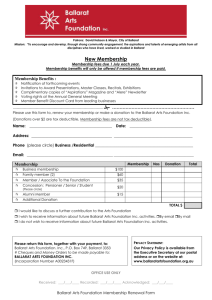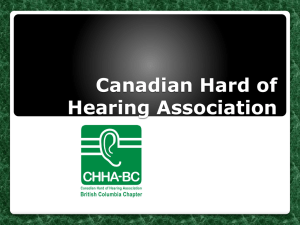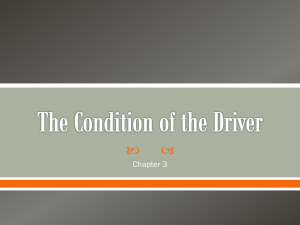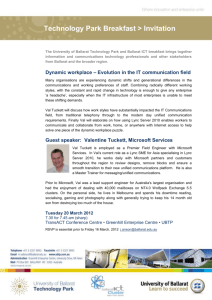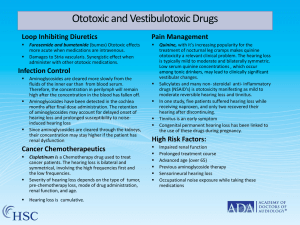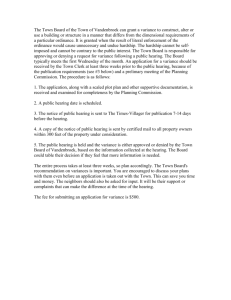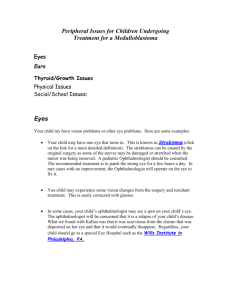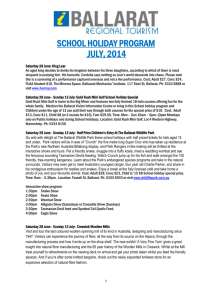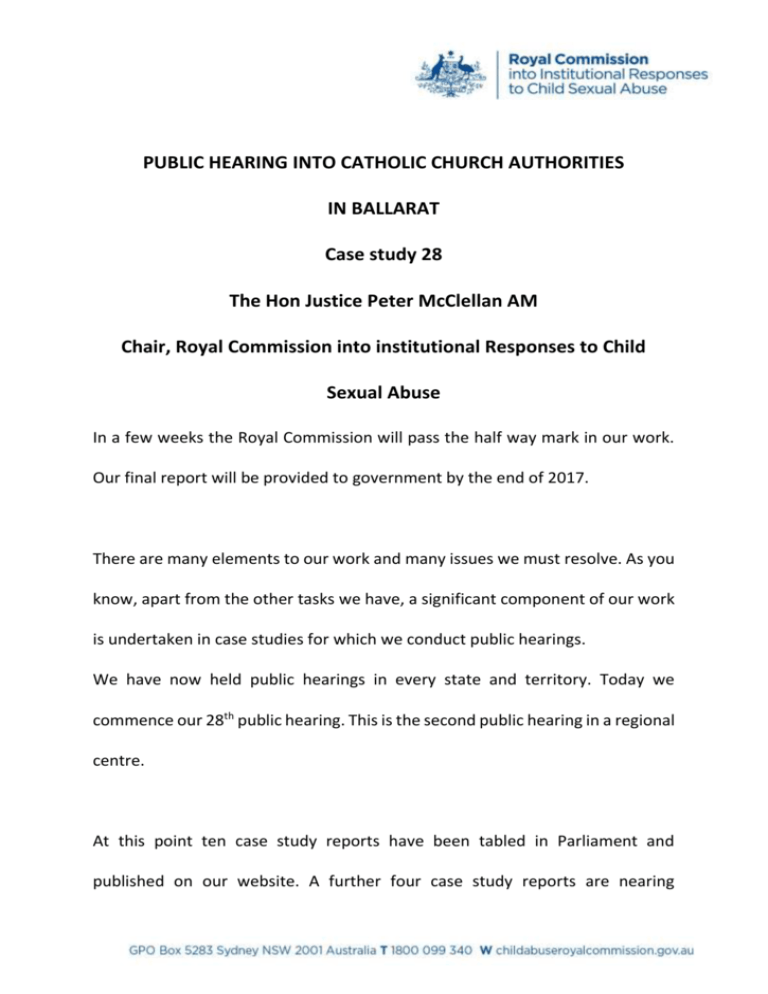
PUBLIC HEARING INTO CATHOLIC CHURCH AUTHORITIES
IN BALLARAT
Case study 28
The Hon Justice Peter McClellan AM
Chair, Royal Commission into institutional Responses to Child
Sexual Abuse
In a few weeks the Royal Commission will pass the half way mark in our work.
Our final report will be provided to government by the end of 2017.
There are many elements to our work and many issues we must resolve. As you
know, apart from the other tasks we have, a significant component of our work
is undertaken in case studies for which we conduct public hearings.
We have now held public hearings in every state and territory. Today we
commence our 28th public hearing. This is the second public hearing in a regional
centre.
At this point ten case study reports have been tabled in Parliament and
published on our website. A further four case study reports are nearing
completion and will be provided to the Governor General and the various
Governors in the near future.
The rate of engagement by the community with the Royal Commission remains
consistent. Around 270 people make contact with us each week. In total our call
centre has received more than 21,000 calls. Nearly 11,000 people have written
to or emailed us since we commenced.
The Royal Commission has the power to refer matters that come to us to other
relevant authorities, including the police, for investigation. To date we have
referred more than 600 matters to the police in various states.
The Commissioners have now completed more than 3400 private sessions and
a further 1400 people are waiting in a queue for their session. The rate of
request for a private session has not diminished and from time to time, usually
in response to particular public hearings, increases.
We have previously spoken of the research reports we have released. A large
number of projects are currently under way. We have recently published the
report: Child sexual abuse prevention programs for pre-schoolers: a synthesis of
current evidence.
In all we have now published 10 substantial research reports.
As you will be aware the Royal Commission has the major task of considering
redress for survivors. The report on that issue is presently being drafted. It will
be detailed and comprehensive and will point the way forward for government,
both the Commonwealth and the States, and institutions in meeting the needs
of survivors. I anticipate that the report will be with the Governor General and
Governors in August. The need for a fair and effective redress scheme has not
been doubted by any government or the institutions that we have consulted.
Fairness and effectiveness will be central to our redress report.
I turn to talk briefly about this hearing. The hearing concerns the response of
various institutions, each a part of the Catholic Church, to allegations of child
sexual abuse. Although we are conscious that child abuse issues in the Ballarat
region extend beyond the Catholic Church it was necessary, having regard to our
resources, to define a case study which ensures the most effective use of those
resources. It must also be remembered that we are constrained by our terms of
reference and cannot conduct a hearing which may prejudice prospective
criminal proceedings. For this reason we cannot presently look at the Ballarat
Orphanage in a public hearing.
Early in the life of the Royal Commission I conducted some private sessions in
Ballarat. Other Commissioners have also conducted private sessions. In addition,
I have met with many local people and spoken at community meetings about
the issue of child sexual abuse. In my various discussions I was told of the
significant scale of the abuse which has occurred in the Ballarat region and of
the great suffering of many people. That suffering extends beyond the individual
survivor. Many members of their families and friends have been deeply affected
by what has occurred. The impacts have been felt throughout the community.
I am conscious of the work that was done by the Victorian Parliamentary Inquiry
into the Handling of Child Abuse by Religious and Other Non-Government
Organisations in the Ballarat region. In undertaking our work in Ballarat it will be
necessary to retrace some of the ground which that inquiry traversed. However,
Counsel Assisting will in her opening draw upon the investigative work that the
Royal Commission has been able to do. The evidence in this public hearing will
extend significantly beyond the evidence which was available to the
parliamentary inquiry.
Because of the nature of the issues which have emerged in the Ballart region we
have decided to conduct this hearing in two parts. Ms Furness will outline the
evidence which she proposes to lead in the first stage of the inquiry. The second
stage is likely to occur towards the end of this year.
The evidence in the first stage of this hearing will include the personal stories of
a number of survivors. That evidence will describe the gross violations of
individuals by ordained members of the Catholic Church. As you are aware, the
Royal Commission has revealed many shocking stories of the betrayal of
children. As we listen to the evidence in this hearing we should all reflect on the
impact for those who have suffered in the Ballarat region, and the thousands of
others who have suffered throughout Australia.
In this hearing there will be evidence from perpetrators. The evidence will not
be directly concerned with the circumstances of their offences. That has already
been dealt with by the Courts. However, the evidence has an important part to
play in the Royal Commission coming to understand both why ordained
members of the Catholic Church became abusers and how the Church
responded to allegations of their abuse. It will be particularly important in
helping the community to learn of the knowledge that people in authority in the
Church had of the abuse and will assist us to assess the response of those in
charge. I appreciate that the evidence of perpetrators may be confronting for
some people, in particular survivors. However without the evidence of
perpetrators, the true story of the response of the Church in Ballarat may never
be completely revealed. Mindful of the possible impact of the hearing, the
Commission staff have been careful to organise, in cooperation with local
services, support for any person who may need it during the hearing.
From my discussions and those of Commission staff with members of the
community, I am aware that there may be different and strongly held views
about the conduct of ordained people and the appropriateness of the response
of leaders of the Church in the Ballarat Diocese. Many want this public hearing.
There are others who doubt the need for a public hearing. Some may not want
the story told. Unless the truth is revealed and known publicly the prospect of
effective healing for survivors and institutions is diminished. When he recently
visited Sri Lanka Pope Francis said of the suffering brought by civil war in that
country
“the process of healing also needs to include the pursuit of truth, not for
the sake of opening old wounds, but rather as a necessary means of
promoting justice, healing, and unity”
The Pope’s words have relevance to the task we are about to undertake in this
hearing.



